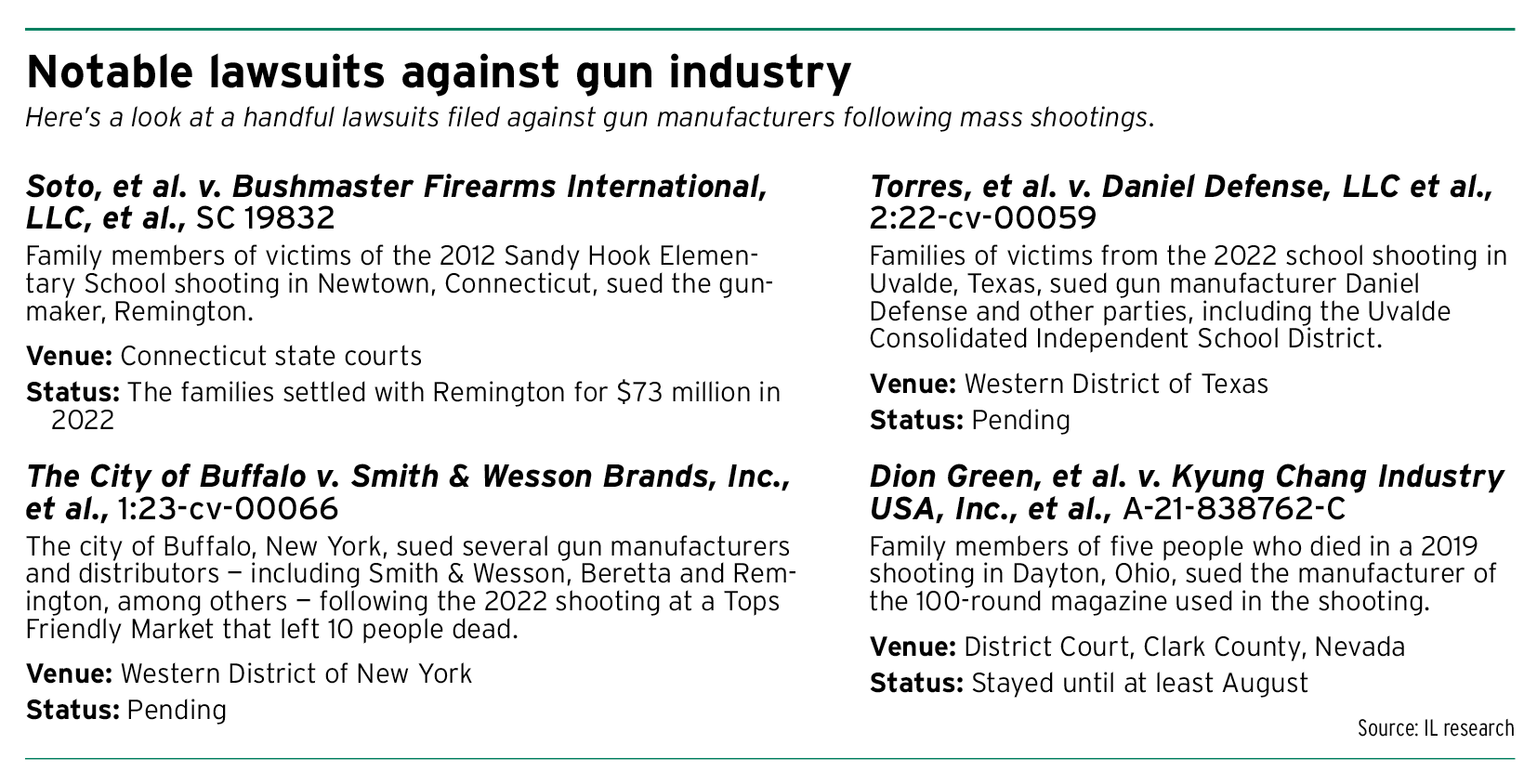Subscriber Benefit
As a subscriber you can listen to articles at work, in the car, or while you work out. Subscribe NowA lawsuit filed by victims and family members of victims of the 2021 FedEx shooting in Indianapolis is out to do something notoriously difficult: hold gun accessory companies at least partly responsible for the carnage someone used their product to create.
But experts point to recent history and the venue in which the lawsuit was filed as reasons the plaintiffs in this case might have a shot at a favorable outcome, whether that’s a verdict or settlement.
The 10-count lawsuit, filed April 13 in the U.S. District Court for the Western District of New York, accuses American Tactical Inc., Schmeisser GmbH and 365 Plus of negligence, public nuisance and unlawful marketing.
American Tactical is the distributor of the 60-round magazine the gunman used in the April 15, 2021, shooting at the FedEx Ground facility on the west side of Indianapolis. Schmeisser GmbH is the German manufacturer of the magazine, and 365 Plus is the global distributor.
The lawsuit — Gurinder Singh Bains, et al. v. American Tactical Inc., et al., 6:23-cv-06208 — was filed two days shy of the two-year anniversary of the shooting that left eight people dead, plus the shooter.
Why the magazine?


The lawsuit notably is focused on the high-capacity magazine used in the shooting, rather than the gun itself.
Jody Madeira, an Indiana University Maurer School of Law professor, said she expects going after the magazine will become more common. She said she doesn’t think it makes much of a difference to focus on a firearm accessory as opposed to the actual firearm because the legal claims are “basically the same.”
That distinction — the accessory vs. the firearm — could come into play here, according to gun-rights attorney Guy Relford.
Relford said the tactic looks like an attempt to get around the 2005 Protection of Lawful Commerce in Arms Act, which protects firearms manufacturers and dealers from being held liable when crimes have been committed with their products. He said the plaintiffs will likely argue the magazine is separate from the gun, while the defendants will say the gun wouldn’t function without it.
Focusing on the magazine is “kind of bizarre,” Relford opined, contending the magazine isn’t inherently dangerous. Still, he said, he can see a judge “going either way” with it.
“It’s creative,” Relford said. “I don’t know if I’d go all the way to smart.”
A similar lawsuit related to the 2019 mass shooting in Dayton, Ohio, is working its way through the state court system in Nevada. In that case, five people who lost loved ones sued the manufacturer of the 100-round magazine used in the shooting. A judge recently stayed the matter until at least Aug. 22.

According to the Brady Center to Prevent Gun Violence, which filed the Dayton case, it was the first lawsuit to focus solely on the manufacture and sale of a high-capacity magazine.
Plaintiffs in the lawsuit related to the FedEx shooting also have a Brady attorney on their legal team. Online court records did not list an attorney for the defendants at Indiana Lawyer deadline.
Jonathan Lowy, who was part of the Brady team that worked on the Dayton lawsuit, said whether it makes a difference to focus on the magazine rather than the gun itself depends on the facts of the case. Either way, Lowy said, the fact that there’s someone who “pulls the trigger” doesn’t mean there can’t be others who are also responsible.
How marketing factors in
Much of the FedEx shooting lawsuit surrounds American Tactical, a New York corporation that is accused of breaching its duty to use reasonable care in marketing, advertising and promoting high-capacity magazines like the one the FedEx shooter used.
In marketing the magazine, the suit says the company knew or should have known of people like the shooter, “who would be attracted to such a weapon accessory and could pose a tremendous risk to the safety of others.” The shooter fits into a category of people, the suit says, who are “impulsive young men with insecurities regarding their masculinity.”
The complaint says American Tactical published video advertisements that show “extreme violence and reckless spraying of bullets.” One video for the model of magazine the shooter used — the Schmeisser Gen II 60-round magazine — has been removed from YouTube for violating the platform’s policies, according to the suit.
It’s similar, Madeira said, to the argument families of nine victims from the 2012 Sandy Hook Elementary School shooting brought against gun manufacturer Remington. The families settled with Remington for $73 million last year.
According to Lowy, “The key point in all of these cases is to focus on the role that gun companies play in facilitating gun violence.” He opined that it’s “often the case” that gun companies make a choice to put profits over public safety.
Gun companies are obligated to sell their products in a careful and responsible way, Lowy said.
“The last thing you should do is to then specifically market those products in a way that’s likely to attract mass killers,” he said.
The gun industry generally enjoys broad immunity from lawsuits, thanks to the federal PLCAA, but the law provides six exceptions.
Those include an action “in which a manufacturer or seller of a qualified product knowingly violated a State or Federal statute applicable to the sale or marketing of the product, and the violation was a proximate cause of the harm for which relief is sought.” Exceptions also include an action brought against a seller for “negligent entrustment or negligence per se,” or when death, physical injuries or property damage are the result of a defect in the design or manufacture of the product.
Though it’s not listed as one of the exceptions, Madeira, who is also co-director of IU Maurer’s Center for Law, Society & Culture, said she’s interested in the lawsuit’s public nuisance claims. She said similar theories have succeeded in opioid lawsuits.
The idea, Madeira said, is that the magazine manufacturer and distributors owed a duty to the general public, and the lawsuit is accusing them of interfering with the public’s rights to health, safety and comfort.
“I really like this idea of the public nuisance,” she said.
Why the venue matters
The public nuisance theory is especially relevant in New York, where the lawsuit was filed. In 2021, state lawmakers there passed legislation intended to allow civil lawsuits to be brought against gun manufacturers and dealers.
The law says, “Those responsible for the illegal or unreasonable sale, manufacture, distribution, importing or marketing of firearms may be held liable for the public nuisance caused by such activities.”

Gun companies challenged the constitutionality of the law, but a federal judge rejected their request to enjoin enforcement of the statute.
Also in New York, the city of Buffalo filed a lawsuit against gun companies last year following the shooting at a Tops Friendly Market that left 10 people dead and three wounded. In announcing the lawsuit, the city’s corporation counsel cited the new law.
But Esther Sanchez-Gomez, the litigation director at Giffords Law Center, noted the law is relatively new and “still shaping the space.”
The complaint from FedEx shooting survivors and victims’ families is strong, she said, and the new law creates an “opportunity for accountability,” but those types of lawsuits will serve as early tests.
“We don’t have this large body of history to point to to say, ‘This is a great case,’” she said.•
Please enable JavaScript to view this content.


